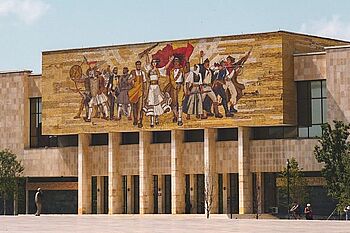Albania was ruled by a brutal communist dictatorship for 45 years. Thousands of people were executed and tens of thousands imprisoned under the party’s leader Enver Hoxha. But almost no officials in charge at the time were punished. The country is now a member of NATO and aspires to join the EU.
Credit: ShkelzenRexha / CC BY-SA 4.0
The Difficult Legacy of Enver Hoxha

Albania – officially the Republic of Albania – is a small state on the western Balkan peninsula in southeastern Europe. Just under three million people live here on less than 30,000 square kilometers. Another 1.5 million Albanians live abroad and about the same number live in neighboring Kosovo. Although religion was banned under the communist regime, a good half of Albania's inhabitants describe themselves as Muslim; 17 percent identify as Christian.
The mosaic on the front of the National History Museum, which opened in 1981, presents Albania's history as a centuries-long struggle for liberation. Albania has only existed as an independent state since 1912. In the late 15th century Albania came under Ottoman rule and was later controlled by (Eastern) Rome. The Albanian prince George Kastriota, known as Skanderbeg, is still celebrated as a national hero who repeatedly beat back the advance of the Ottoman troops.
Although it remained neutral, Albania was occupied by various powers during World War I. After several changes of government, the principality became a republic in 1925. But the authoritarian president Ahmet Zogu had himself crowned king just three years later. In 1939 Italy occupied the underdeveloped European agricultural country, and in 1944 German troops moved in. For several years, nationalists and communists waged a partisan struggle against both powers from which the communists emerged victorious.
In October 1944, the "Anti-Fascist National Liberation Committee" declared itself the provisional government of Albania. Enver Hoxha, the general secretary of the Communist Party, became prime minister. After the party’s election victory in December 1945, Hoxha declared the country a People's Republic and established a Stalinist dictatorship. Formerly non-communist partisans were murdered along with the few opposition members in parliament. The old elites were expropriated, arrested or killed and the economy was nationalized or forcibly collectivized. In 1967, all religious practice was also banned. Several tens of thousands of people fell victim to the Albanian secret police, the Sigurimi (security).
In its foreign policy, socialist Albania was closely allied with neighboring Yugoslavia at first. However, in 1948, following the Tito-Stalin split, it broke off all relations, closed its borders and aligned itself more closely with the Soviet Union. Then, in 1961, it had a falling out with the Soviet Union, left the Warsaw Pact in 1968 and ultimately ally itself with China. In 1978 it turned away from the Middle Kingdom as well and began propagating an Albanian national communism. This found expression in the construction of some 170,000 bunkers designed to defend the country against foreign invaders. These abrupt changes in direction were often accompanied by bloody purges within the Communist Party.
Hoxha died in 1985, but the cult of personality around him continued: An honor guard watched over his grave, a museum in Tirana was dedicated to him and statues commemorated furthermore the dictator in many squares. But with the collapse of communism in Eastern Europe, Albanians also participated in demonstrations and engaged in a mass exodus to Western embassies. The first non-communist party was formed in December 1990. However, the communists won the quickly scheduled elections in March 1991, leaving Hoxha's successor Ramiz Alia in power. He was not replaced until 1992 when Sali Berisha, the leader of the opposition Democratic Party, became president.
After the end of the dictatorship, Albania was shaken by severe economic and political crises. Mass emigration in the early 1990s was followed by the so-called Lottery Uprising in 1997. This led to the collapse of state order and the reliance on foreign troops to help restore order. The country did not stabilize until after the turn of the millennium. In 2006 Albania signed an association agreement with the EU, and joined NATO three years later. Edi Rama from the former Communist and now Socialist Party has served as prime minister since 2013. Albania has been negotiating with the EU in Brussels since 2018 over its membership into the EU (as of February 2022).
Albanian Republic
| Area: | 28,750 km² |
| Inhabitants: | 2.9 million (2019) |
| Population growth: | - 4 % per year |
| Population density: | 105 inhabitants per km² |
| Seat of government: | Tirana |
| Official language: | Albanian |
| Political system: | Parliamentary republic |
| Head of state: | President Ilir Meta |
| Head of government: | Prime Minister Edi Rama |
| Freedom status: | 66/100 |
| BIP per capita: | 14.648 USD (adjusted for purchasing power, 2019) |
(Shqipëria)
(Հայաստան)
(Azərbaycan)
(Bosna i Hercegovina)
(България)
(Danmark)
(Eesti)
(Suomi)
(France)
(საქართველო)
(Ελλάδα)
(United Kingdom)
(Ireland)
(Қазақстан)
(Hrvatska)
(Latvija)
(Lietuva)
(Moldova)
(Црна Гора)
(Македонија)
(Polska)
(România)
(Россия)
(Sverige)
(Suisse)
(Србија)
(Slovensko)
(Slovenija)
(España)
(Česko)
(Україна)
(Magyarország)
(Città del Vaticano)
(Беларусь)
(Κύπρος)